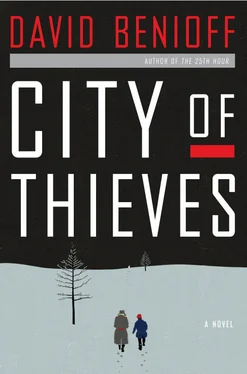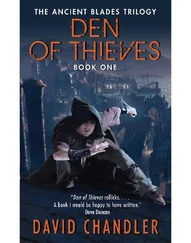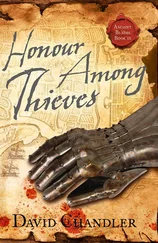Soon the company was marching again. A change had been made, however. Six Russians now walked in the front, ten meters ahead of the closest Germans, serving as human minesweepers. Each step was a harrowing experience for them, waiting for the snapped tripwire, the sprung spring. It must have been tempting to run, but they wouldn’t have gotten three steps before the troopers gunned them down.
Nobody walked near Markov’s accuser. He was a man infected, a carrier of plague. He talked quietly to himself, a long and unheard argument, his eyes flashing left and right as he waited for reprisal.
I was a dozen men behind him, slogging through the slush between Vika and Kolya. If any of the prisoners spoke loudly enough for the Germans to hear, one of the troopers would snap, “Halts Maul!” Nobody needed a translator to understand the sentiment and the Russian in question would quickly shut his mouth, lower his head, and walk a little faster. Still, it was possible to carry on a conversation if you kept your voice very low and one eye on the guards.
“I’m sorry about your friend,” I murmured to Vika.
She kept walking without answering or acknowledging that she had heard me. I thought I might have offended her.
“He seemed like a good man,” I added. Both sentences were utterly banal, the kind of lazy sentiments you might use at the funeral of a distant relative you never really liked. I couldn’t blame her for ignoring me.
“He wasn’t,” she said at last. “But I liked him anyway.”
“That traitor ought to be dangling from a tree,” whispered Kolya, dipping his head so his voice wouldn’t carry. He glared at the back of the betrayer’s head. “I could break his neck with my bare hands. I know how to do it.”
“Leave it alone,” said Vika. “He doesn’t matter.”
“He mattered to Markov,” I said.
Vika glanced up at me and smiled. It wasn’t the cold carnivorous smile I had seen before. She seemed surprised by my comment, as if she had just heard a mongoloid whistle Für Elise without missing a note.
“Yes, he mattered to Markov. You’re a strange one.”
“Why?”
“He’s a twisty little devil,” said Kolya, giving me an affectionate punch in the kidney. “But he plays a nice game of chess.”
“Why am I a strange one?”
“Markov’s not important,” she said. “I’m not important. You’re not important. Winning the war, that’s the only important thing.”
“No,” I said, “I disagree. Markov was important. So am I and so are you. That’s why we have to win.”
Kolya raised his eyebrows, impressed that I was standing up to the little fanatic.
“I’m especially important,” he announced. “I’m writing the great novel of the twentieth century.”
“You two are half in love,” she said. “Do you know that?”
The grim procession of weary men had bogged down in front of us, the foot traffic stalled, confused prisoners trying to figure out why we weren’t moving anymore. One of the bootless Russian soldiers had stopped walking. Other men from his captured unit begged him to move, pleading and cursing. He shook his head, never saying a word, his feet rooted in the snow. A friend tried to shove him forward, but it was useless; he had chosen his spot. When the troopers rushed over, waving their submachine guns and hollering in their own language, the Red Army men reluctantly backed away from their doomed comrade. He smiled at the Germans and raised one hand in a mock Nazi salute. I looked away just in time.
An hour before sunset the company halted beside a forbidding redbrick schoolhouse, one of the People’s Projects built during the second Five-Year Plan, the lead glass windows narrow as medieval embrasures. Two-foot-high bronze letters above the front door spelled out Lenin’s famous line: GIVE US THE CHILD FOR EIGHT YEARS AND IT WILL BE A BOLSHEVIK FOREVER. One of the Russophone invaders had scrawled a rejoinder in white paint that had dripped before the words had dried: GIVE US YOUR CHILDREN FOR EIGHT SECONDS AND THERE WILL BE NO MORE BOLSHEVIKS.
The Wehrmacht had seized the schoolhouse for use as a command center. Six Kübelwagens were parked near the entryway and a bareheaded trooper, his blond hair as short and yellow as a newborn chick’s, refueled one of them with a green steel jerrycan. He watched with no apparent interest as the company approached with its convoy of prisoners.
Officers gave orders, ranks broke, most of the Germans headed inside, already shrugging out of their heavy packs, gabbing with each other, loud and happy, ready for the showers (if the water was running) and a hot meal. The remainder of the Gebirgsjäger, a platoon of forty soldiers, irritated that they were still on duty, surly now with hunger and fatigue after a long day hiking through the endless Russian forest, prodded us along to the side of the building.
A German officer waited for us there, reclining in a folding chair, reading a newspaper while he smoked. He glanced up with an idle smile when we walked into view, happy to see us, as if we were friends he had invited over for supper. Setting aside his newspaper, he finally stood, nodding, inspecting our faces, the state of our clothing, the quality of our boots. He wore a gray Waffen-SS uniform with green cuffs on the sleeves, his gray overcoat hanging on the back of the folding chair. Vika, walking beside me, murmured, “Einsatzkommando.”
When we had been formed into rough lines, the Einsatzkommando dropped his cigarette into the snow and nodded at the Gebirgsjäger’s slack-skinned translator. They spoke together in confident Russian, as if showing off for their eavesdropping captives.
“How many?”
“Ninety-four. No, ninety-two.”
“Yes? And two who could not join us? Very good.”
The Einsatzkommando faced us, gazing from man to man, looking us in the eyes. He was a handsome man, his black field cap tilted back from his sunburned forehead, his delicate mustache giving him the air of a jazz singer.
“Don’t be afraid,” he told us. “I know you’ve been reading the propaganda. The Communists want you to think we’re barbarians, here to destroy you. But I’m looking at your faces and I see good, honest workmen and farmers. Is there even a single Bolshevik among you?”
No one raised his hand. The German smiled.
“I didn’t think so. You are smarter than that. You understand that Bolshevism is simply the most radical expression of the eternal Jewish quest for world domination.”
He looked over the blank faces of the Russian men arrayed before him and gave a good-humored shrug.
“But we don’t need the fancy talk. You understand the truth in your bones and that is what matters. There is no reason for conflict between our peoples. Both of us have a common enemy.”
He signaled to one of the troopers, who picked up a stack of newspapers from a wood pallet beside the folding chair and divvied them out to five of his fellow mountain rangers. They walked down the rows of prisoners, handing one newspaper to each Russian. My copy was Komsomol’s Truth ; Vika and Kolya had Red Star .
“I understand this is a difficult concept to grasp, after so many years of propaganda. But believe this for the truth: the German victory will be a victory for the Russian people. If you don’t understand this now, you will understand it soon, and your children will grow up knowing it.”
The sinking sun made giants of our shadows. The Einsatz officer enjoyed the sound of his own words and the impression he made upon us. His Russian was technically perfect, though he made no attempt to hide his accent. I wondered where he had learned the language, if he’d been born in one of the Deutschvolk colonies in Melitopol or Bessarabia. He looked up at an ellipsis of three little clouds far above us in the silvering sky.
Читать дальше












